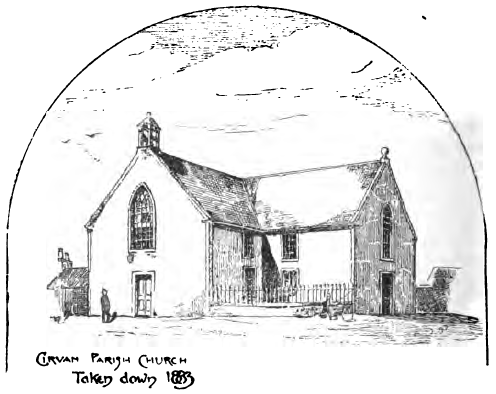|

MOST people in this district know that Thomas Carlyle in his
"Reminiscences" thus alludes to the late minister of Girvan:—"The next farm
(Corson's of Nether Craigenputtock), very stupid young brother, now minister
in Ayrshire, used to come and bore me at rare intervals." Perhaps it might
be interesting to give some of Mr Corson's reminiscences of Mr Carlyle, so
that the balance may hang even between them.
Mr Corson had, of course, a very high estimate of Carlyle. As an instance
of his kindliness, he told me that Carlyle had offered to teach him German,
and that he was in the habit of laying his disused pipes in a cranny of the
Rev. William Corson. 25
dike for any passer-by that was needy. But it was Mrs Carlyle who was his
special favourite. She was very pretty, he said, and used to be compared to
Mary, Queen of Scots. And when he was about to be licensed as a probationer,
she thus good-naturedly gave him her advice :—" Now, William, don't be going
about seeking for a church, like the rest of them, but go out to the
highways and hedges, and preach away like a house on fire."
"How did she address her husband?"—"She always called him "Carlyle."—"Did
they keep a free table"— "No, I never saw spirits in their house except
once, and that was when we had been shovelling away the snow in front of the
doorway. She then insisted on each of us taking a dram."—"Were they greatly
respected by the people about?"—"She was, and was always called the lady."
But the country folks thought he had married her for her money, and looked
down on him accordingly. They also blamed him for not shutting the gates on
the public road after he passed through them, so they sometimes went the
length of jeering him as he rode past, and would shout out for him to
hear—"I say Jean, if I had been gaun to buy a man, I wad hae bocht a brawer
man than that!' "
"Did they attend church?"—"They went to Dunscore church once together,
and I think she went occasionally when they had visitors, but they were
always very friendly with the minister at "the Manse."—"How were you brought
into contact with him?"—"Our houses were within a short distance of each
other, and we used to walk together." —"Can you remember any of his
remarks?"—" He used to call the abrupt ending of a certain road through the
moor, " the grave of the last sixpence," and would speak of the Glaister
hills as 'great dumb monsters sleeping there since the Creation.'"
"Did he ever write to you?"—"Yes, I have one letter of his, written when
I was missionary at Gilmerton, saying— 'Don't be over-anxious about
promotion Promotion, if you are faithful, will come when most needed and
least expected.,"—"When did you see him last?"—"In Dumfries, at Mrs Aitken's.
It was after his wife's death, and she told rfle not to allude to that event
before him, as it upset him. He was busy correcting proofs at the time of my
visit; but he at once laid aside his work, and began to talk."
When Mr Corson came to Girvan, everything was against him. There had been
a long and costly lawsuit over his induction. The church was cold and
comfortless, and half-empty beside. His preaching was by no means eloquent,
and his manners were ungainly. And yet, by dint of sheer good-heartedness,
and honest, unpretending work, he won his way to a respectable congregation,
a new church, and the general esteem of the town.
Many stories are told of Mr Corson's blunders and gaucheries, but
these were all condoned on account of his unfailing good-nature, and his
hearty desire for everybody's welfare. He now lies buried in the Doune
Cemetery; and in the handsome new church that was built during his
incumbency, a stained-glass window was recently erected, bearing this
inscription —"Rev. William Corson, Minister of this Parish from May 1848
to Dec. 1887. Erected by the Congregation, 1890."
Mr Corson was naturally proud, as may be presumed, of his illustrious
neighbour at Craigenputtock (Craig of the hawk) , and although that
neighbour spoke severely of him, it is to be hoped that the good opinion-of
the Girvan congregation may be set down as a somewhat counterbalancing
testimony. The Cartyles were all self-assertive, and severe in their
judgments of their neighbours, an amusing instance of which was once given
me by a friend. He had been introduced to James Carlyle, youngest brother of
the author, one day at Annan, and he naturally enough remarked— "You'll be
proud of your great brother." But the answer he received, in the broadest
Annandale, was this—"Mei prood o' him! I think he should be prood d me!" My
friend then observed—"I shall be glad of a visit from you if you are in my
locality"; to which James replied—"Do you think when I'm in your locality, I
have nocht to do but call on yow?*' Verily, the Carlyles, with all their
cleverness, were somewhat "ill to put up wi'"
|

